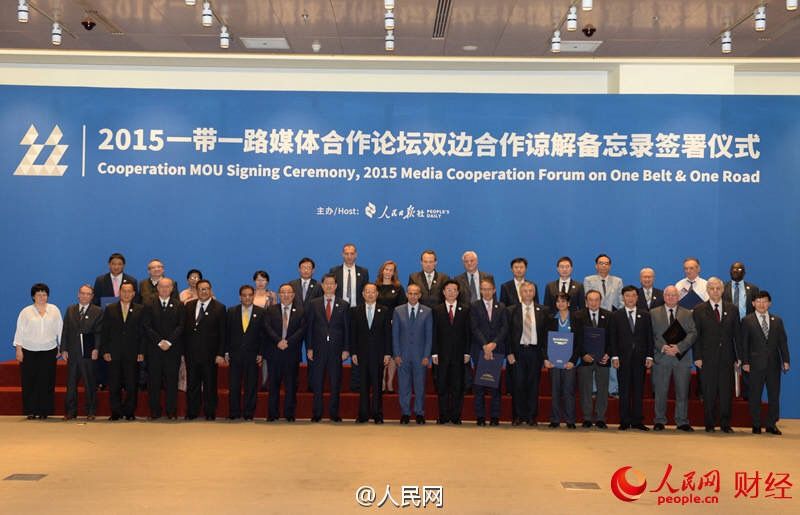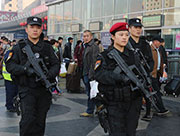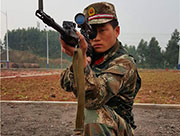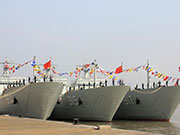


The China-proposed Belt and Road Initiative should not be seen as expansionism, but rather as an open initiative creating opportunities for the world, Chinese Foreign Minister Wang Yi said recently after detailing his scorecard of the proposal. Deputies and global scholars agreed that the initiative, which is now being translated into concrete efforts, is benefiting the world.
"The Initiative is China's idea, but the opportunities it creates belong to the world," Wang told a press conference on the sidelines of the national legislature's annual session.
The Belt and Road Initiative refers to the Silk Road Economic Belt that links China with Europe through central and western Asia, and the 21st-Century Maritime Silk Road connecting China with southeast Asia, Africa and Europe.
The two routes were first proposed by Chinese President Xi Jinping when he visited Central and Southeast Asia in 2013. An action plan was issued in 2015, and is now being implemented.
“So far, more than 70 countries and international organizations have expressed interest, and over 30 countries have signed agreements with China to build the Belt and Road”, the foreign minister elaborated the updates at the conference.
Meanwhile, the China-initiated Asian Infrastructure Investment Bank has started operation, and the first group of projects financed by the Silk Road Fund have been launched.
Thanks to the initiative, a connectivity network is taking shape. Early harvests have been achieved in infrastructure, finance and people-to-people exchange, he added, citing the examples of the China-Pakistan Economic Corridor and the China-Mongolia-Russia Economic Corridor.
Freight train services now link China directly to Europe, according to Wang, illustrating that railways linking Budapest and Belgrade as well as Jakarta and Bandung have begun construction.
Important steps have been taken in the China-Laos Railway and China-Thailand Railway, which are both important parts of the Pan-Asia Railway Network, the minister added.
Wang stressed that all-round progress was made in industrial capacity cooperation. China has institutionalized such cooperation with almost 20 countries and a large number of projects were launched.
The accomplishments achieved by the Initiative were hailed by international heavyweights and scholars.
Masood Khalid, Pakistani ambassador to China, praised the role of the China-Pakistan Economic Corridor, saying that as a flagship project of the initiative, it will benefit the people in both nations and the region at large.
Jaeho Hwang, a scholar from the South Korea-based Hankuk University of Foreign Studies noted that China's diplomacy will perform better with the Belt and Road initiative.
“The initiative is now yielding more concrete outcomes, and this will help China better practice its neighborhood diplomacy philosophy characterized by amity, sincerity, mutual benefit and inclusiveness,” Hwang added.
“This initiative echoes the general call of Asian and European countries for development and cooperation. It shows that China is transitioning rapidly from a participant in the international system to a provider of public goods,” Wang said at Tuesday’s press conference.
He added that in building the routes, China will follow the principle of wide consultation, joint contribution and shared benefits, saying that “it is an open initiative rather than some expansionism”.
The People’s Daily commented in an article that an open and inclusive China welcomes the world to board the train of its development and will proactively create more opportunities for it.
Deputies attending this year’s two sessions also discussed on how to better build the routes.
Liu Zhenya, a member of the National Committee of the Chinese People's Political Consultative Conference (CPPCC), suggested the connectivity of power grids among the countries along the routes as a way to ultimately set up a global energy network.
Tian Gang, also a member of CPPCC’s National Committee, advised negotiating trade and investment agreements with countries on the route, so that the consumer goods industry can be restructured.
Day|Week

 Beijing steps up security for 'two sessions'
Beijing steps up security for 'two sessions' Chongqing sniper’s new record: 13 holes on a rice grain
Chongqing sniper’s new record: 13 holes on a rice grain Women put on spring dresses in Hangzhou
Women put on spring dresses in Hangzhou UAVs at Unmanned Systems Exhibition & Conference in UAE
UAVs at Unmanned Systems Exhibition & Conference in UAE PLA's paratroopers conduct night training
PLA's paratroopers conduct night training Three new-type tank landing ships join the East China Sea Fleet
Three new-type tank landing ships join the East China Sea Fleet 3,492 reflector panels of China's mega telescope installed
3,492 reflector panels of China's mega telescope installed Stunning Kuche on the Silk Road
Stunning Kuche on the Silk Road Tunisian man creates art of sand in Hangzhou
Tunisian man creates art of sand in Hangzhou Goddess teacher shares fitness program online
Goddess teacher shares fitness program online